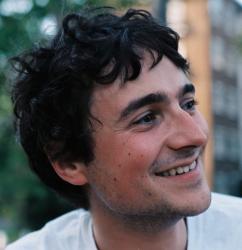Israel is home to a thriving film industry with strong traditions of comedy and social critique, but you wouldn’t know it from the media narrative about the country, which focuses on war and sectarian strife. There is war in Large Soldier – the story is set in 1973, during the fleeting conflict with Egypt and Syria – yet it remains unseen, an exotic presence on the fringes of a bittersweet coming-of-age tale.
Sherry is a bored 15-year-old living a humdrum life in a Tel Aviv suburb. She bickers with her family and frets about her appearance. When she volunteers to fold military attire, she takes the opportunity to slip a note into a trouser pocket, offering herself as a pen pal. (She judiciously picks a “large” uniform.) A soldier replies, and after a few furtive exchanges, they meet – but don’t exactly hit it off.
Large Soldier subtly suggests the ways in which a population is shaped by the backdrop of constant militarism. Sherry romanticises soldiers: when she tells a friend she’s “met” one, she can’t suppress her pride. One minute, the girls are discussing acquaintances who have died in action; the next, they’re sharing kissing tips. Sherry’s mother and pen pal, for their parts, are glum and buttoned-up. Communication issues are a trope of teen flicks, of course, but this film raises the possibility that the older characters’ emotions have been stunted by the stress of war.
If all this sounds crushingly downbeat, I’ve misspoken. Writer-director Noa Gusakov cites Marielle Heller’s The Diary of a Teenage Girl as an inspiration, and like that film, this one marries its serious themes with sharp comedy and wistful retro stylings. The soundtrack consists of jaunty synth pop, the palette of late-afternoon ochres and auburns. Gusakov cannily evokes the period on a $50,000 budget by sticking mostly to interiors.
But the film is anchored by Neta Roth’s turn as Sherry. Spotted by the filmmakers on Facebook (the modern day’s substitute for pen pals), Roth gives an astute and sympathetic performance, effortlessly riding the film’s shifts between moods. Gusakov’s script, which was developed as part of the Berlinale Talents programme, is based on an autobiographical short story by her late mother, Sherry Shapira Gusakov, and the relationships it depicts feel vividly real. Like Roth, the director is relatively new to filmmaking – this is her first major work since graduating from film school – but she has the confidence of a pro.

 Alex Dudok de Wit
Alex Dudok de Wit